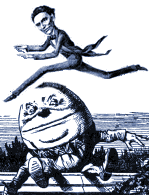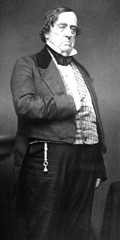
This web page is part of the Michigan Today Archive. To see this story in its original context, click here. |
|||||
|

Prof. Richard W. Bailey of the English department has traced the first documented use of "Michigander" to an 1848 speech by Abraham Lincoln. In Nineteenth Century English (University of Michigan Press, 1996), Bailey cites Lincoln’s usage as an example of word-formation by blending — Michigan + gander. Forming a word by blending parts of others, Bailey says, “was made famous by Lewis Carroll, who in 1872 devised chortle as a blend of chuckle and snort. Such creations he called ‘portmanteau words,’ drawing on the idea of a piece of luggage containing compartments.” [See box.] Bailey lists other portmanteau words, including squattocracy (1843 < squatter + aristocracy, Australia), chattermag ‘chatterbox’ (coined by William Barnes from chattering + magpie, 1844), squarson (1876 < squire + parson), slanguage (1885 <slang + language), insinuendo (1885 < insinuation + innuendo), beerage (1891 <beer + peerage), brunch (1896 < breakfast + lunch), smog (1905 < smoke + fog). “For the
most part, these blends were, at least initially, intentionally Lincoln’s
rhetoric probably fit Bailey’s requirements. In a July 27,
1848, speech in the US House of Representatives, the young Illinois
Whig was assailing Lewis Cass, the first governor of the Michigan
Territory, who was campaigning for the presidency at the time, and
running on a “popular sovereignty" (i.e., “state’s
rights”) platform that would have allowed the expansion of
slavery into territory gained in the Mexican
Lincoln accused Cass and the Democrats of campaigning on the coat tails of the late General and President Andrew Jackson, that is, of exaggerating their military accomplishments: “Like a horde of hungry ticks you have stuck to the tail of the Hermitage lion [Jackson] to the end of his life,” Lincoln said, “and you are still sticking to it, and drawing a loathsome sustenance from it, after he is dead. … But in my hurry I was very near closing on the subject of military tails before I was done with it. There is one entire article of the sort I have not discussed yet; I mean the military tail you Democrats are now engaged in dovetailing onto the great Michigander [emphasis added]. “Yes sir, all his biographers (and they are legion) have him in hand, tying him to a military tail, like so many mischievous boys tying a dog to a bladder of beans. True, the material they have is very limited; but they drive at it, might and main. He invaded Canada without resistance, and he outvaded it without pursuit. As he did both under orders, I suppose there was, to him, neither credit or discredit in them; but they [are made to] constitute a large part of the tail.”
|
|||||
|
Michigan Today News-e is a new, monthly electronic publication for
alumni and friends. |
| MToday NewsE | |||
|
Michigan
Today
online alumni magazine
University
Record
faculty &
staff newspaper
MGoBlue
athletics
News
Service
U-M
news
University of Michigan
gateway
| Site of the Month | |||||||
|
|
• Maps |


